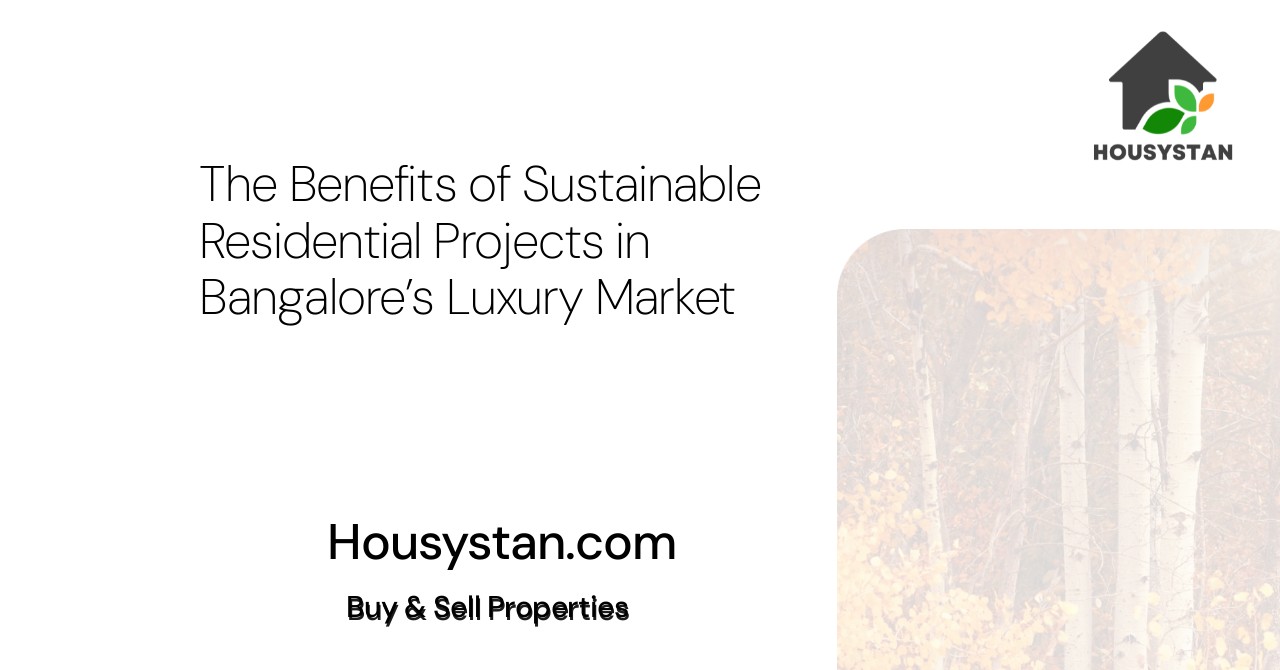The Benefits of Sustainable Residential Projects in Bangalore’s Luxury Market
Read latest blogs and articles from Housystan

The Information mentioned here was last updated on:
21/2/2026The Benefits of Sustainable Residential Projects in Bangalore’s Luxury Market
Introduction: The Green Revolution in Bangalore’s Luxury Real Estate
Bangalore, famously known as India’s Silicon Valley, is witnessing a transformative shift in its luxury real estate sector. As urbanization accelerates and environmental concerns rise, both developers and homebuyers are gravitating toward sustainable residential projects. These developments are not only redefining luxury living standards but also introducing a new era of eco-consciousness in the high-end property market. This article explores the multifaceted benefits of sustainable residential projects in Bangalore’s luxury segment, offering insights into why they are rapidly becoming the preferred choice among discerning buyers.
- Verified Tenants/Buyers
- Unlimited Property Listing
- Zero subscription/charges fee
Understanding Sustainable Luxury in Residential Real Estate
In the context of real estate, sustainability extends beyond energy efficiency and green architecture. It encompasses responsible construction practices, resource optimization, wellness-centric amenities, and community-friendly layouts. Bangalore, with its cosmopolitan population and tech-savvy residents, provides the perfect backdrop for integrating these principles into upscale residential projects. The result is an emerging class of luxury homes that combine opulence with environmental stewardship, setting new benchmarks for urban living.
Key Drivers of Sustainability in Bangalore’s Luxury Market
The surge in sustainable luxury real estate is driven by several interconnected factors. First, there is growing awareness about climate change and its impact on urban environments. Second, well-informed buyers are increasingly seeking homes that align with their eco-friendly values. Third, government policies and incentives are encouraging green building initiatives. Lastly, the long-term cost benefits and enhanced lifestyle quality offered by sustainable projects make them a logical investment for future-focused homeowners.
The Core Benefits of Sustainable Residential Projects
1. Enhanced Energy Efficiency
One of the most significant advantages of sustainable luxury homes is their superior energy efficiency. Developers incorporate advanced technologies such as solar panels, energy-efficient lighting, double-glazed windows, and smart home automation systems. These features drastically reduce energy consumption, resulting in lower utility bills and a reduced carbon footprint. For residents, this translates into significant savings and a more environmentally responsible lifestyle.
2. Water Conservation and Management
Bangalore’s history of water shortages has made water conservation a top priority for developers. Leading sustainable projects integrate rainwater harvesting systems, water recycling units, and low-flow fixtures. These initiatives not only ensure a reliable water supply but also promote judicious usage, benefiting both residents and the broader community.
3. Superior Indoor Air Quality and Wellness
Luxury homes in sustainable projects are designed with wellness at their core. The use of non-toxic building materials, air purification systems, and ample ventilation leads to healthier living spaces. Residents enjoy cleaner air, fewer allergens, and a noticeable improvement in overall well-being. Many projects also include landscaped gardens, rooftop greens, and nature-inspired amenities that foster relaxation and mental health.
4. Smart Waste Management Solutions
Modern sustainable residential complexes in Bangalore prioritize efficient waste management. Segregation at source, composting, and recycling facilities are now common features. These efforts reduce the environmental impact of luxury developments and encourage residents to adopt responsible waste disposal habits.
5. Long-Term Cost Savings
Although the initial investment in sustainable luxury homes may be higher, the long-term savings are substantial. Lower energy and water bills, reduced maintenance costs, and slower depreciation of property value all contribute to a strong return on investment. Additionally, as sustainability regulations become more stringent, non-compliant properties may face higher operational costs and reduced marketability.
6. Future-Proof Investment
As environmental regulations tighten and green certifications become standard, sustainable residential projects are likely to experience higher appreciation rates. Luxury buyers who invest in green homes position themselves at the forefront of an evolving market, ensuring their properties remain desirable and relevant over time.
7. Enhanced Community Living
Sustainable projects emphasize community-centric layouts and shared spaces. Features such as organic gardens, solar-lit walkways, bicycle tracks, and communal activity zones foster a sense of belonging and encourage social interaction among residents. This holistic approach to modern living is a key differentiator in Bangalore’s competitive luxury market.
The Role of Certifications and Green Standards
Developers in Bangalore are increasingly pursuing certifications like IGBC (Indian Green Building Council), LEED (Leadership in Energy and Environmental Design), and GRIHA (Green Rating for Integrated Habitat Assessment). These certifications serve as benchmarks for sustainable construction and assure buyers of the project’s environmental credentials. For luxury homebuyers, such certifications are not just badges of honor but indicators of a forward-thinking lifestyle choice.
Changing Buyer Preferences in the Luxury Segment
Today’s luxury homebuyers in Bangalore are more informed, conscious, and demanding than ever before. They seek homes that reflect their values, offer smart technology integration, and promote overall well-being. The desire for privacy, security, and exclusivity remains, but there is a clear shift towards eco-friendly features and sustainable amenities. As a result, developers are innovating continuously to meet and exceed these evolving expectations.
Challenges and the Road Ahead
While the advantages of sustainable luxury projects are clear, the journey is not without challenges. High upfront costs, lack of awareness among some buyer segments, and regulatory hurdles can slow down adoption. However, ongoing education, government incentives, and the undeniable benefits of green living are gradually overcoming these barriers. As sustainability becomes mainstream, it will reshape the definition of luxury living in Bangalore.
Conclusion: The Future of Luxury Living is Green
Sustainable residential projects are ushering in a new chapter in Bangalore’s luxury real estate market. They offer a compelling blend of modern amenities, environmental responsibility, and long-term value—qualities that resonate with today’s discerning buyers. As the demand for green homes continues to rise, these projects will set the standard for future developments, ensuring that luxury and sustainability go hand in hand in India’s most dynamic city.